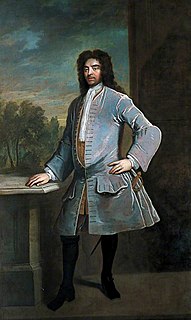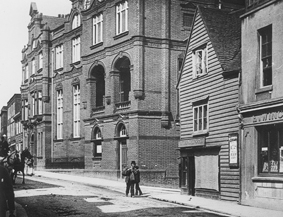
Sir Joseph Williamson, PRS was an English civil servant, diplomat and politician who sat in the House of Commons of England variously between 1665 and 1701 and in the Irish House of Commons between 1692 and 1699. He was Secretary of State for the Northern Department 1674–79.
Joseph Allen may refer to:
John Williamson may refer to:
Joseph Brennan may refer to:
William Williamson may refer to:

William Durkee Williamson was the second Governor of the U.S. state of Maine, and one of the first congressmen from Maine in the United States House of Representatives. He was a member of the Democratic-Republican Party. Williamson was also an early historian of Maine.

Sir Joseph Williamson's Mathematical School (SJWMS) is a boys' grammar school with academy status in Rochester, Kent, also referred to either as Rochester Math or The Math School.
Joseph Williams may refer to:
The name Williamson was first used by the people of an ancient Scottish tribe called the Strathclyde Britons. It is derived from the Norman personal name William. The name literally was derived from the patronymic expression son of William.
Joseph Williamson was an American politician and lawyer. He served as President of the Maine Senate in 1833. During his career, Williamson also worked as a businessman, banker and newspaper editor.
Robert B. Williamson was a Maine judge.
The Raymond H. Fogler Library is an academic library at the University of Maine in Orono. The library's collections include approximately more than 1 million volumes, nearly 4 million periodical subscriptions, 1.6 million microforms, 2.2 million United States Federal, Maine State, and Canadian federal and provincial government publications.
The Northeast Coast campaign was the first major campaign of Queen Anne's War in New England. Alexandre Leneuf de La Vallière de Beaubassin led 500 troops made up of French colonial forces and the Wabanaki Confederacy of Acadia. They attacked English settlements on the coast of present-day Maine between Wells and Casco Bay, burning more than 15 leagues of New England country and killing or capturing more than 150 people. The English colonists were able to protect some of their settlements, but a number of others were destroyed and abandoned. Historian Samuel Drake reported that, "Maine had nearly received her death-blow" as a result of the campaign.

The Northeast Coast Campaign (1745) occurred during King George's War from 19 July until 5 September 1745. Three weeks after the British Siege of Louisbourg (1745), the Wabanaki Confederacy of Acadia retaliated by attacking New England settlements along the coast of present-day Maine below the Kennebec River, the former border of Acadia. They attacked English settlements on the coast of present-day Maine between Berwick and St. Georges, within two months there were 11 raids - every town on the frontier had been attacked. Casco was the principal settlement.
Not to be confused with the Battle of Falmouth (1690)

The Northeast Coast Campaign (1746) was conducted by the Wabanaki Confederacy of Acadia against the New England settlements along the coast of present-day Maine below the Kennebec River, the former border of Acadia. during King George's War from July until September 1746. They attacked English settlements on the coast of present-day Maine between Berwick and St. Georges, within two months there were 9 raids - every town on the frontier had been attacked. Casco was the principal settlement.

The Northeast Coast Campaign (1747) was conducted by the Wabanaki Confederacy of Acadia against the New England settlements along the coast of present-day Maine below the Kennebec River, the former border of Acadia. during King George's War from July until September 1747. They attacked English settlements on the coast of present-day Maine between Berwick and St. Georges, within two months there were 11 raids - every town on the frontier had been attacked. Casco was the principal settlement.

Fryeburg is a town in Oxford County, Maine, United States. The population was 3,449 at the 2010 census. Fryeburg is home to Fryeburg Academy, a private preparatory school, and the International Musical Arts Institute. The town is also site of the Fryeburg Fair, which each October attracts approximately 300,000 visitors

The Queen Victoria Memorial in Lancaster, Lancashire, England, is a Grade II* listed building. It stands in the centre of Dalton Square, Lancaster facing Lancaster Town Hall. It was erected in 1906, being commissioned and paid for by James Williamson, 1st Baron Ashton.
This page is based on this
Wikipedia article Text is available under the
CC BY-SA 4.0 license; additional terms may apply.
Images, videos and audio are available under their respective licenses.





